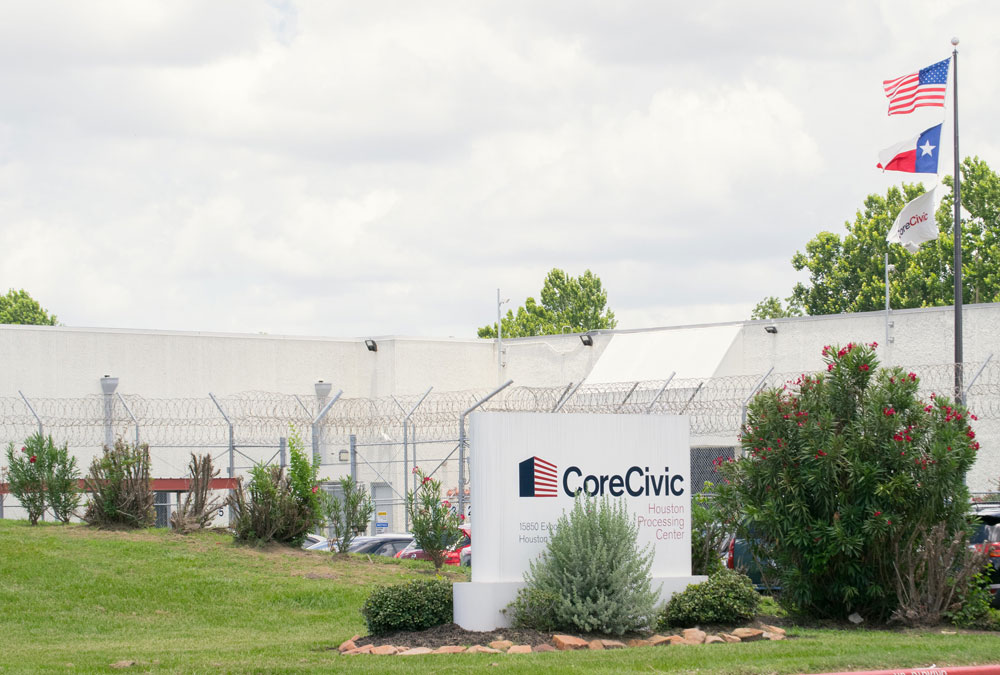
June 20, 2020; Arizona Republic
As the demand to defund police rings through the streets of communities across the country, other segments of the criminal justice system are being affected, too. We have discussed in other newswires the cash bail system and the movement against it, but it has been a while since we addressed the need to empty out our overused prison system—the largest in world on a per-capita basis and filled disproportionately with people of color.
One aspect of this work is in the movement to eliminate the use of private prisons, in part through demanding that lending institutions divest. This appears to be working to some extent, according to In The Public Interest, who released an update yesterday saying the two largest private prison operators are facing a number of “financial headwinds.” Here are the weather conditions that might explain that phenomenon:
In April, Fitch downgraded CoreCivic’s credit rating “due to the negative capital access trends for private prison operators.” In other words, because a number of big banks have begun to sever ties with the industry.
We’re proud that our November 2016 report helped spur a movement that eventually forced all of CoreCivic’s and GEO Group’s banking partners to say “no more” to the companies. That made them work harder to find financing to build new prisons and immigrant detention centers. Late last year, even after CoreCivic struck a $250 million deal with a Japanese financial firm, investors remained worried about the future.
Then there’s COVID-19. As a real estate investor wrote, “The virus spreading inside its facilities could be a risk for [CoreCivic] and expose it to lawsuits if no proper precaution is taken.”
Finally—and likely most significantly—the #BlackLivesMatter movement is putting pressure on all levels of government to root out systemic racism. Black people are jailed at more than four times the rate of white people. When it comes to private prisons, companies like CoreCivic imprison people of color even more disproportionately than publicly operated prisons. This disparity has carried over to so-called alternatives to incarceration. In Cook County, Illinois, for instance, black people make up 24 percent of the population yet 67 percent of those on ankle monitors, which are provided by a private contractor.
But the headwinds do not end there. Earlier this week, five prisoners and the NAACP filed a federal lawsuit against the Arizona Department of Corrections, Rehabilitation, and Reentry, accusing the state of practicing slavery by sending people to private prisons to “generate revenues and profits for the monetary benefit of corporate owners, shareholders and executive management.” They hope to take the issue before the US Supreme Court.
Sign up for our free newsletters
Subscribe to NPQ's newsletters to have our top stories delivered directly to your inbox.
By signing up, you agree to our privacy policy and terms of use, and to receive messages from NPQ and our partners.
There are six private prisons in the Arizona system, holding approximately 7,740 inmates, or around one-fifth of the prisoner population statewide. Coincidentally, although around 12 percent of inmates in the Arizona system are Black, all of the plaintiffs in this case are white.
In the suit, the director of the Arizona Corrections Department is accused of treating prisoners as “property” and abrogating their human dignity.
Arizona’s private prisons are operated by three companies, GEO Group, CoreCivic Inc., and Management and Training Corporation, who between them hold 90 percent of inmates in private prisons across the entire United States.
In a well-cited filing made with the US Security and Exchange Commission in late December, and in direct contradiction to public interests, CoreCivic baldly stated that its interests were not in seeing the out-of-control numbers in its facilities decrease:
The demand for our facilities and services could be adversely affected by the relaxation of enforcement efforts, the expansion of alternatives to incarceration and detention, leniency in conviction or parole standards and sentencing practices or through the decriminalization of certain activities that are currently proscribed by criminal laws.
Presumably, then, the corporation, which is an active deep-pocket lobbyist in state and national legislatures, would not be for a defunding of the police. In fact, writes In the Public Interest, “Private prison corporations are a stain on an already unjust, bloated, and shameful criminal justice system. They spend millions of dollars every year influencing public officials on criminal justice issues. And the less money CoreCivic and GEO Group pocket, the more money we can spend on things like mental health care, well-funded schools, and affordable housing, things that actually keep our communities healthy and safe.”—Ruth McCambridge
Correction: This article has been altered from its initial form to correct the percentage of Black inmates in Arizona prisons. NPQ regrets the error.













